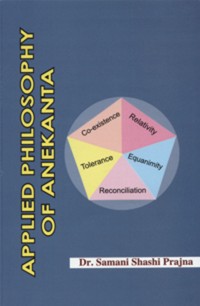Anekānta is the basic concept to find a well-ordered nation. Everybody wishes for an ideal society. T.G. Kalghatgi rightly observes that the spirit of anekānta is very much necessary in the society especially in the present day scenario where conflicting ideologies are trying to assert supremacy aggressively. Satish Kumar has written an article in a book ‘You are Therefore I Am”, which is intune with the anekāntic perspective.[1] Anekānta brings the spirit of intellectual and social tolerance. Today, freedom of thoughts is the foremost human right, which is applicable to all levels of people, i.e., high and low, rich and poor, white and black, employee and employer, student and teacher and so forth. It is clear that everyone’s thoughts, attitudes, sentiments, interests and habits are bound to differ. Anekānta teaches us to tolerate and understand this fact and accept the difference of opinions of the members of society for the peaceful co-existence of all the members of society. The moment one begins to consider the angle from which a contrary viewpoint is put forward, one begins to develop tolerance, which is the basic requirement of the practice of 'ahimsa'.
The origin of all wars fought on the battlefield is of ideas and beliefs. Anekānta is a view which puts a healing touch at the root of human psyche and tries to stop this war of bloodshed. It makes all absolutes in the field of the thought quite irrelevant and imparts maturity to the thought process. If mankind would properly understand and adopt this doctrine of anekānta, it will be realized that the real revolution was not the French or the Russian but the one which taught the man to develop his power of understanding from all possible aspects.
Anekānta teaches us to give due respect to the views of others. The only obstacle is our pre-conceived notion that what I think is self-complete truth, what my religious text says is true, this sort of perception towards anything creates commotion in the society by way of communal and religious disharmony. Even in the Sūyagado.[2] Mahavira says, those who praise their own faith and ideologies and blame those of their opponents and thus they distort the truth and will remain confined to the cycle of birth and death. Thus Jains always held that it is wrong,if not dangerous,to presume that one’s own creed alone represents truth. Tolerance is, therefore,the characteristic of Jain ideology as propounded by Mahāvīra.[3] The need of the present state of society is to review the conditions of families, where we see non-healthy relations between the members of the families. The ever-increasing numbers of divorces is the clear witness of the deterioration in the level of tolerance in the present era. The greatest outcome of anekānta is that, it teaches us to accept a tinge of truth in others viewpoint and once it is realized man begins to understand and tolerate others. I think this tolerance has a deep sense in itself and can solve the many present day social problems.
 Dr. Samani Shashi Pragya
Dr. Samani Shashi Pragya

